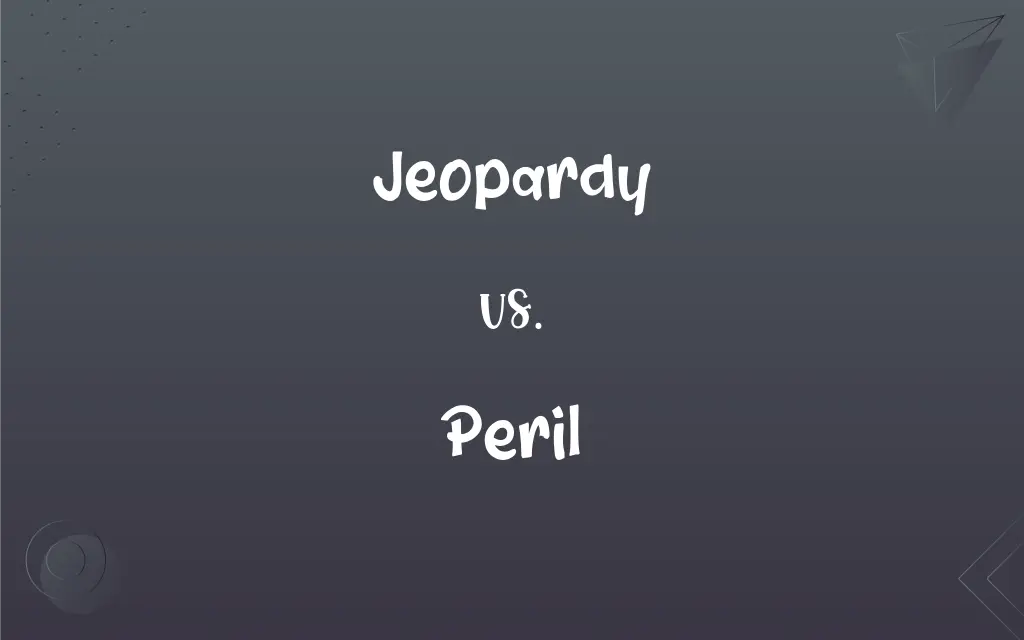Jeopardy vs. Peril: What's the Difference?
By Janet White & Aimie Carlson || Updated on May 22, 2024
Jeopardy refers to the risk of harm or loss, often in a legal or formal context, while peril denotes immediate and serious danger, typically more intense and urgent.

Key Differences
Jeopardy is the risk of harm, loss, or failure, frequently used in legal and formal contexts. It signifies a potential threat that may or may not result in actual damage. Peril, on the other hand, represents immediate and serious danger, suggesting an urgent threat to safety or well-being. While both terms involve risk, jeopardy often implies a condition of being at risk, whereas peril indicates an active and severe threat.
Jeopardy is commonly seen in legal settings, such as the phrase "double jeopardy," which refers to the prohibition against being tried twice for the same crime. Peril is used to describe situations where there is an imminent threat to life or safety, such as natural disasters or dangerous activities.
Jeopardy can be used metaphorically to describe situations where something valuable is at risk, like a career or reputation. Peril tends to evoke more dramatic imagery, emphasizing the seriousness and urgency of the threat, often seen in adventure or survival contexts.
Jeopardy can imply a state of uncertainty and potential risk, whereas peril conveys a sense of impending and unavoidable danger. Both terms highlight the presence of risk, but peril is generally perceived as more immediate and severe.
Comparison Chart
Definition
Risk of harm or loss
Immediate and serious danger
ADVERTISEMENT
Usage Context
Legal, formal
Urgent, intense
Common Phrases
Double jeopardy
In peril, mortal peril
Intensity of Threat
Potential risk
Severe and imminent danger
Metaphorical Use
Career in jeopardy
Life in peril
Emotional Impact
Suggests caution
Evokes urgency and fear
ADVERTISEMENT
Jeopardy and Peril Definitions
Jeopardy
Vulnerability to adverse circumstances.
The ancient artifact was in jeopardy of being stolen.
Peril
Immediate and serious danger.
The hikers were in mortal peril during the storm.
Jeopardy
The risk of harm, loss, or failure.
His actions put his career in jeopardy.
Peril
Risk of harm or injury.
The bridge is in peril of collapsing.
Jeopardy
Legal exposure to a trial or penalty.
The defendant was in double jeopardy after the mistrial.
Peril
Threat to safety or well-being.
The explorers faced many perils in the jungle.
Jeopardy
A situation involving potential danger or risk.
The team's championship hopes were in jeopardy after the loss.
Peril
Serious and urgent threat.
The ship was in peril of sinking during the hurricane.
Jeopardy
Condition of being in danger.
The project was in jeopardy due to funding cuts.
Peril
Imminent danger
A sign warning of the peril of falling rocks.
Jeopardy
Risk of loss or injury; peril or danger.
Peril
Exposure to the risk of harm or loss
In peril of losing his savings.
Jeopardy
(Law) A defendant's risk or danger of conviction when put on trial.
Peril
Something that endangers or involves risk
Couldn't avoid the perils of the desert.
Jeopardy
Danger of loss, harm, or failure.
The poor condition of the vehicle put its occupants in constant jeopardy.
Peril
To expose to danger or the chance of injury; imperil.
Jeopardy
To jeopardize; to endanger.
Peril
A situation of serious and immediate danger.
Your life is in peril.
Jeopardy
Exposure to death, loss, or injury; hazard; danger.
There came down a storm of wind on the lake; and they were filled with water, and were in jeopardy.
Look to thyself, thou art in jeopardy.
Peril
Something that causes, contains, or presents danger.
The perils of the jungle (animals and insects, weather, etc.)
Jeopardy
To jeopardize.
Peril
(insurance) An event which causes a loss, or the risk of a specific such event.
Jeopardy
A source of danger; a possibility of incurring loss or misfortune;
Drinking alcohol is a health hazard
Peril
(transitive) To cause to be in danger; to imperil; to risk.
Peril
Danger; risk; hazard; jeopardy; exposure of person or property to injury, loss, or destruction.
In perils of waters, in perils of robbers.
Adventure hardWith peril great achieved.
Peril
To expose to danger; to hazard; to risk; as, to peril one's life.
Peril
To be in danger.
Peril
A source of danger; a possibility of incurring loss or misfortune;
Drinking alcohol is a health hazard
Peril
A state of danger involving risk
Peril
A venture undertaken without regard to possible loss or injury;
He saw the rewards but not the risks of crime
There was a danger he would do the wrong thing
Peril
Pose a threat to; present a danger to;
The pollution is endangering the crops
Peril
Put in a dangerous, disadvantageous, or difficult position
Peril
Imminent and unavoidable danger.
The villagers were in peril from the approaching flood.
FAQs
How is jeopardy used in legal terms?
In legal terms, jeopardy refers to the risk of being tried or punished, as in "double jeopardy."
Can peril be used metaphorically?
Yes, peril can be used metaphorically to describe serious threats or risks, such as "economic peril."
What does jeopardy mean?
Jeopardy refers to the risk of harm, loss, or failure, often in legal or formal contexts.
What does peril mean?
Peril denotes immediate and serious danger, suggesting an urgent threat to safety or well-being.
Is peril more intense than jeopardy?
Yes, peril is generally more intense and urgent than jeopardy.
Can jeopardy refer to non-physical risks?
Yes, jeopardy can refer to non-physical risks, such as career or reputation being at risk.
What is an example of peril in a sentence?
The climbers faced peril as they ascended the treacherous mountain.
What is double jeopardy?
Double jeopardy is a legal principle that prohibits a person from being tried twice for the same crime.
How can peril be avoided?
Peril can be avoided by taking precautions and making informed decisions to reduce risk.
Can jeopardy be positive?
Jeopardy is typically negative, implying risk or potential loss, but it can motivate caution and preparedness.
Can a situation be both in jeopardy and in peril?
Yes, a situation can be described as both if it involves potential risk and immediate danger.
How does jeopardy affect decision-making?
Awareness of jeopardy can lead to more cautious and deliberate decision-making to avoid risks.
Does jeopardy imply immediate danger?
Not necessarily; jeopardy implies potential risk, which may not be immediate.
What are some common phrases using jeopardy?
Common phrases include "in jeopardy" and "double jeopardy."
Is peril used in everyday language?
Peril is less common in everyday language and is often used in more dramatic or urgent contexts.
What are some common phrases using peril?
Common phrases include "in peril" and "mortal peril."
Is jeopardy used in everyday language?
Yes, jeopardy is commonly used to describe various risks in everyday situations.
How does peril impact behavior?
Peril often prompts immediate action to mitigate danger and ensure safety.
Can peril be positive?
Peril is generally negative, indicating serious danger, but overcoming peril can lead to personal growth and resilience.
What is the opposite of jeopardy?
The opposite of jeopardy is security or safety.
What is the opposite of peril?
The opposite of peril is safety or security.
About Author
Written by
Janet WhiteJanet White has been an esteemed writer and blogger for Difference Wiki. Holding a Master's degree in Science and Medical Journalism from the prestigious Boston University, she has consistently demonstrated her expertise and passion for her field. When she's not immersed in her work, Janet relishes her time exercising, delving into a good book, and cherishing moments with friends and family.
Co-written by
Aimie CarlsonAimie Carlson, holding a master's degree in English literature, is a fervent English language enthusiast. She lends her writing talents to Difference Wiki, a prominent website that specializes in comparisons, offering readers insightful analyses that both captivate and inform.































































